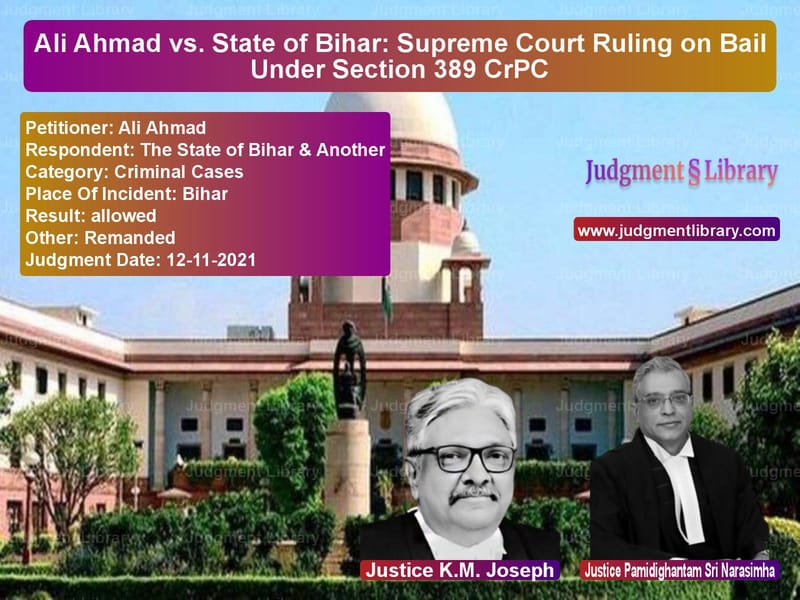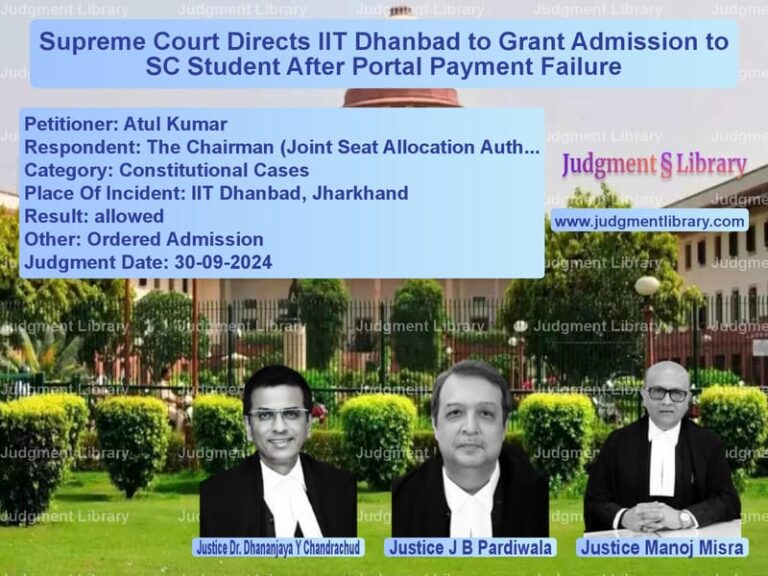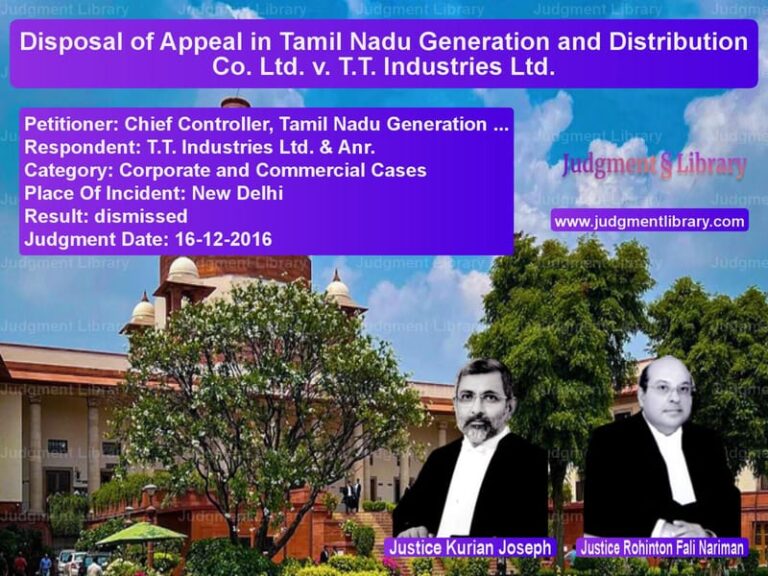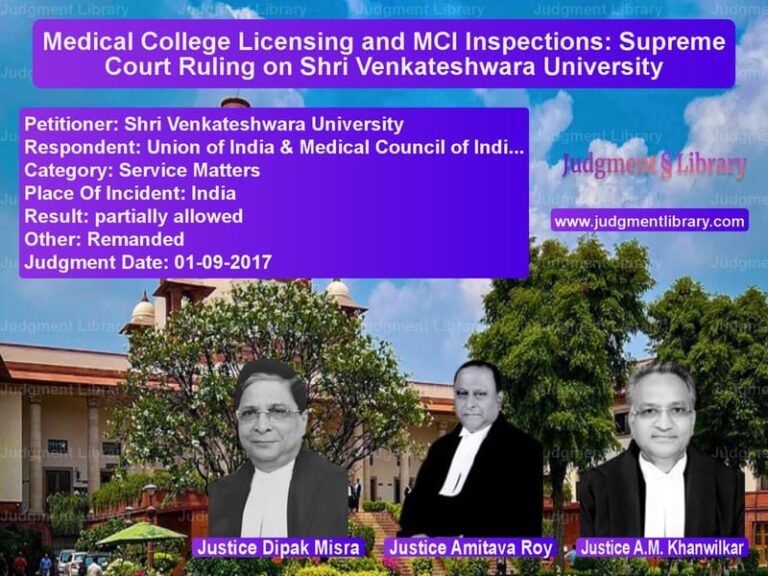Ali Ahmad vs. State of Bihar: Supreme Court Ruling on Bail Under Section 389 CrPC
The case of Ali Ahmad vs. The State of Bihar & Another pertains to the grant of bail under Section 389 of the Code of Criminal Procedure (CrPC). The Supreme Court examined whether the Patna High Court had followed the correct procedure in granting bail to the convicted individuals in a murder case. The decision reaffirms the importance of procedural compliance when granting bail post-conviction and lays down critical guidelines for High Courts dealing with similar matters.
Background of the Case
Ali Ahmad, the appellant, challenged the Patna High Court’s order granting bail to the second respondent, who was convicted under Section 302 of the Indian Penal Code (IPC) for murder and sentenced to life imprisonment. The conviction had been handed down by the Trial Court after evaluating the evidence. The second respondent filed a criminal appeal before the High Court, and along with it, an application under Section 389 CrPC for the suspension of sentence and bail.
The High Court granted bail to the convict without providing adequate reasoning or following the mandatory procedure laid down in Section 389 CrPC. This led the appellant to challenge the order before the Supreme Court.
Arguments by the Petitioner (Ali Ahmad)
- The petitioner contended that the High Court had failed to adhere to the first proviso of Section 389(1) CrPC, which mandates that before granting bail, the Public Prosecutor must be given an opportunity to file objections in writing.
- He cited the Supreme Court’s judgment in Atul Tripathi v. State of Uttar Pradesh (2014) 9 SCC 177, which held that compliance with this provision is essential to ensure that courts consider all relevant factors such as the gravity of the offense, manner of crime, and public confidence in the justice system.
- The petitioner emphasized that granting bail post-conviction under Section 389 CrPC is distinct from granting bail under Section 439 CrPC, which applies to undertrial prisoners.
- He further argued that the High Court’s order lacked adequate reasoning, making it legally unsustainable.
Arguments by the Respondents
- The respondents argued that the Public Prosecutor had been heard before granting bail and that the first proviso to Section 389 CrPC does not mandate filing written objections in every case.
- They contended that the High Court had the discretion to grant bail, and the Supreme Court should not interfere unless the decision was grossly unreasonable.
- The second respondent had already been out on bail for nearly two years, and no complaints of misuse of liberty had been reported.
- The respondents further asserted that the petitioner was not prejudiced by the High Court’s decision and that no procedural error warranted the Supreme Court’s interference.
Supreme Court’s Judgment
The Supreme Court bench, comprising K.M. Joseph and Pamidighantam Sri Narasimha, examined the legal requirements under Section 389 CrPC. The Court observed:
“Every law is intended to be followed. The fact that it is intended to be followed has been taken note of by this Court in the judgment reported in Atul Tripathi. It is despite this that, in the impugned orders, it appears that the mandate of the first proviso has not been followed.”
The Court noted that the grant of bail post-conviction differs significantly from pre-trial bail and requires stricter scrutiny. It emphasized that the High Court must:
- Give the Public Prosecutor an opportunity to file written objections before considering a bail application.
- Provide clear and detailed reasons for granting bail, particularly in cases involving serious offenses like murder.
- Ensure that procedural safeguards under Section 389 CrPC are strictly followed.
The Supreme Court held that the High Court had failed to adhere to these legal requirements. Consequently, it set aside the High Court’s order granting bail to the second respondent.
Impact of the Judgment
The ruling in this case has significant implications for the criminal justice system, particularly in matters of bail post-conviction. Key takeaways from the judgment include:
- Ensuring procedural compliance: High Courts must strictly adhere to procedural safeguards when granting bail to convicts.
- Upholding public confidence in justice: The Court highlighted the importance of maintaining public confidence in the justice system by ensuring that convicts do not obtain bail arbitrarily.
- Setting a precedent for future cases: The decision reaffirms the Supreme Court’s stance in Atul Tripathi and other rulings that emphasize procedural fairness in bail applications under Section 389 CrPC.
Conclusion
The Supreme Court’s ruling in Ali Ahmad vs. The State of Bihar & Another underscores the importance of procedural fairness in criminal appeals. By setting aside the High Court’s order, the Court reaffirmed that granting bail to convicted individuals requires rigorous judicial scrutiny and adherence to legal procedures. The judgment serves as a vital precedent for future cases, ensuring that bail in serious criminal matters is granted only after due consideration of all legal requirements.
Petitioner Name: Ali Ahmad.Respondent Name: The State of Bihar & Another.Judgment By: Justice K.M. Joseph, Justice Pamidighantam Sri Narasimha.Place Of Incident: Bihar.Judgment Date: 12-11-2021.
Don’t miss out on the full details! Download the complete judgment in PDF format below and gain valuable insights instantly!
Download Judgment: ali-ahmad-vs-the-state-of-bihar-&-supreme-court-of-india-judgment-dated-12-11-2021.pdf
Directly Download Judgment: Directly download this Judgment
See all petitions in Bail and Anticipatory Bail
See all petitions in Attempt to Murder Cases
See all petitions in Custodial Deaths and Police Misconduct
See all petitions in Judgment by K.M. Joseph
See all petitions in Judgment by P.S. Narasimha
See all petitions in allowed
See all petitions in Remanded
See all petitions in supreme court of India judgments November 2021
See all petitions in 2021 judgments
See all posts in Criminal Cases Category
See all allowed petitions in Criminal Cases Category
See all Dismissed petitions in Criminal Cases Category
See all partially allowed petitions in Criminal Cases Category







